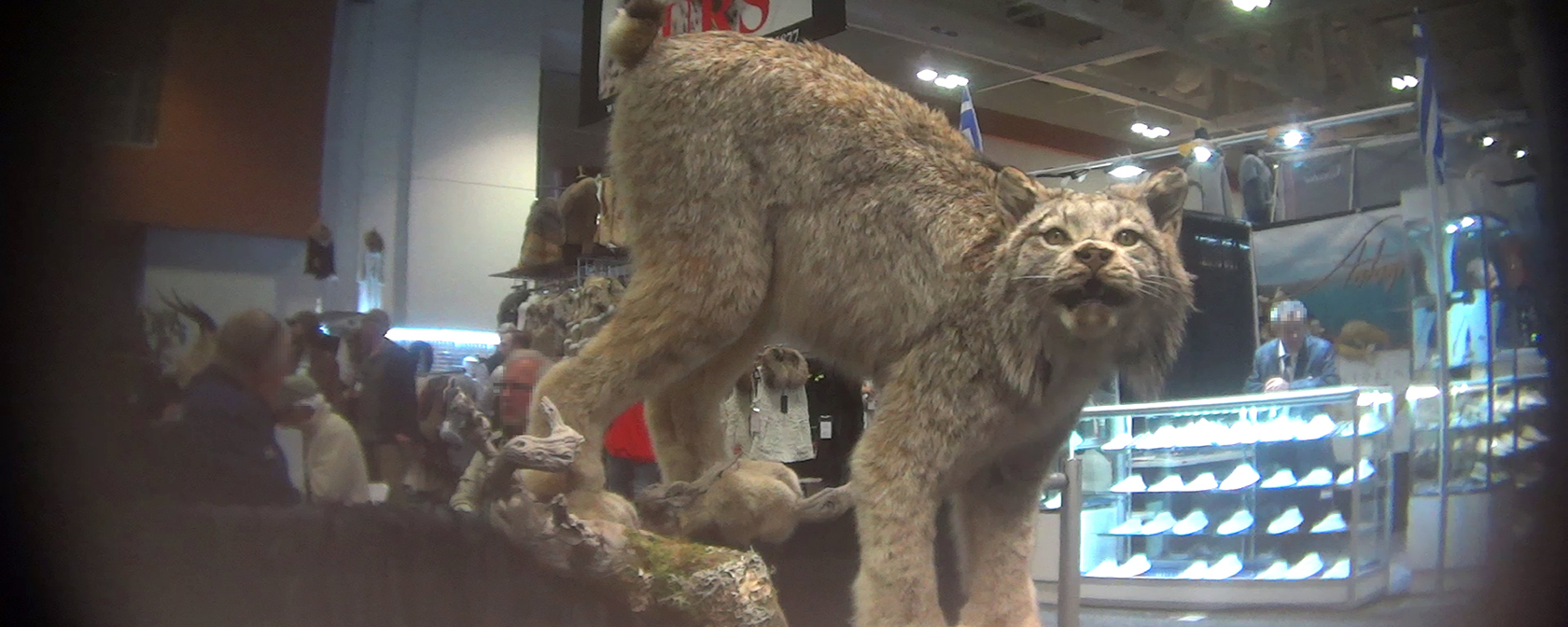By Sara Amundson and Kitty Block
Elephant-skin luggage and leopard claw jewelry are just some of the supposedly luxurious products our undercover investigator discovered at Safari Club International’s annual hunting convention, where more than 850 exhibitors convened in February in Nashville, Tennessee. As disturbing as the artifacts of animals already lost to trophy hunting were, they paled in comparison to the expeditions being promoted to cause future death to animals already struggling to survive, like rhinos, elephants and other imperiled animals, as well as a canned hunt to kill captive-bred lions, far easier to shoot when corralled into small spaces.
One outfitter at Safari Club International’s convention emphasized to the undercover investigator that hunting rhinos now is ideal because “[they are] gonna be closed down the soonest to import to the United States because of the numbers going down…”
Other vendors displayed or offered for sale items made from threatened and endangered species in potential violation of state law. One taxidermy company, for example, advertised its services by displaying the horns of a federally endangered black rhino. Tennessee state law prohibits the commercial use of endangered species.
Our investigators have gone undercover at Safari Club International’s convention since 2016 to chronicle the cruelty and waste of trophy hunting. While most Americans abhor trophy hunting, Safari Club International continues to raise money off the slaughter of majestic animals from around the world, and the U.S. continues to import more trophies from hunting expeditions in foreign countries than any other nation. Whether auctioning off a $100,000 Alaskan hunting trip to kill grizzly bears, moose and other beloved species; or a $143,000 lion and leopard hunting trip in Zambia, the convention turns imperiled wildlife into shameful commodities. This year, the auctions are estimated to bring in almost $6 million for Safari Club International to fund its lobbying efforts that include reducing U.S. Endangered Species Act protections.
Our investigator found for sale rhino trophy hunts and rhino “darting” excursions in South Africa, from vendors that also offer the critically endangered black rhino as “add-ons” through their websites. Outfitters exhibiting at the event also advertised hunts for the critically endangered forest elephant on their websites that could be added on to any hunts sold at the convention. The most recent assessment from the International Union for Conservation of Nature (IUCN) for this species states that it has undergone a reduction of 80% of its global population over the last 100 years. This decline will likely continue if successful conservation programs do not take hold and harmful industries like trophy hunting are allowed to continue.
Although Safari Club International ostensibly instituted a ban on promoting canned lion hunts back in 2018, our investigator found exhibitors promoting these hunts, where customers pay to shoot captive-bred lions. South Africa, the hub for canned lion hunting, announced in 2021 that it will take steps to put an end to this despicable industry, so it’s chilling to see it persisting in this forum. As our undercover investigator said in a new Humane Voices podcast, canned hunting “is something that SCI doesn’t—at least supposedly doesn’t—endorse… but it is very much something that is found at their conventions.”
We are releasing our Trophy Hunting by the Numbers report, which zeroes in on the role the U.S. plays in international trophy hunting and examines the deleterious impacts of trophy hunting on animal populations. Between 2014 and 2018, the U.S. imported more trophies than any other country in the world, including 72,600 hunting trophies of mammals listed under the Convention on International Trade in Endangered Species of Wild Fauna and Flora (CITES); more than 10,000 of those trophies were also from species listed as Threatened or Endangered under the U.S. Endangered Species Act.
Not only does trophy hunting cause immense suffering, but it also destroys animal families and reverberates through ecosystems. We will keep exposing this shameful celebration of animal death and pressing for legislation to end the glorification and promotion of trophy hunting. Animals deserve to be fully protected from such cruelty.
You can take a stand with us, by urging the U.S. Fish and Wildlife Service to strengthen and finalize the proposed Endangered Species Act regulations for African elephants to improve their protections. You can also support our work to end trophy hunting.
Kitty Block is President and CEO of the Humane Society of the United States.




